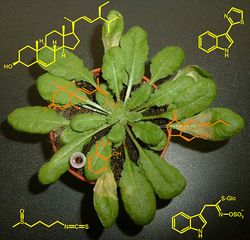Insights into the plant immune system
Plants have to cope with changing environmental conditions throughout their lifetime. To successfully grow and develop, they must adequately respond to a variety of biotic and abiotic factors. For instance, plants are equipped with an intricate defence network with which they counteract attempted invasion by bacterial, fungal, or viral plant pathogens. Our research group is interested in the molecular responses that plants activate after recognition of microbial invaders.
These responses are not confined to the initial site of microbial attack but can extend to other plant parts. For instance, plants are able to establish a broad-spectrum resistance of the whole plant against a subsequent pathogen triggered by a first recognition or infection of a pathogen. This phenomenon, termed systemic acquired resistance (SAR), has been recognized in many different plants species including the model plant Arabidopsis thaliana.
Our project within CEPLAS intends on the identification of new metabolites which are exclusively synthesized in plants after pathogen-infections, investigate their function in inducible plant-defence and defining a regulatory network of pathogen inducible metabolite pathways in plants. The identification and functional characterisation of immune-regulatory metabolites holds great potential for the development of novel plant protection strategies.
Contribution by Elia Stahl, Institute for Plant Molecular Ecophysiology, Heinrich Heine University
Planter’s Punch
Under the heading Planter’s Punch we present each month one special aspect of the CEPLAS research programme. All contributions are prepared by our young researchers.
